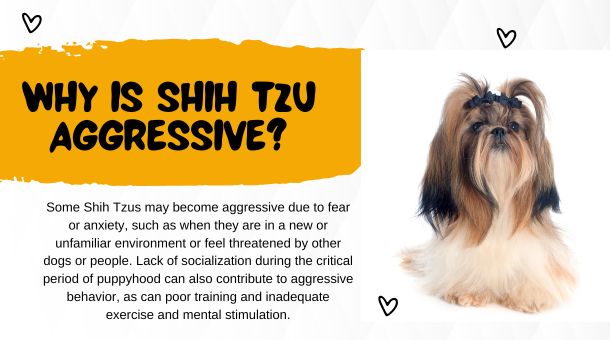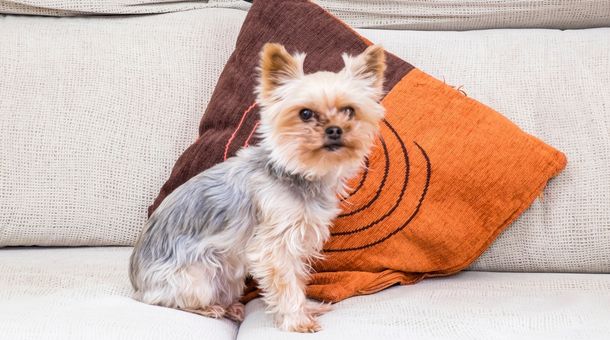In this article, we will explore Why are Shih Tzus the worst dogs and provide a balanced analysis of the pros and cons of owning a Shih Tzu.
Shih Tzus are a popular breed of dogs known for their cute and cuddly appearance. However, despite their popularity, some people believe that Shih Tzus are the worst dogs.
Whether you are considering getting a Shih Tzu or simply curious about this breed, this article will provide valuable insights and information.
What is shih tzus?
Shih Tzus are a small breed of dog that originated in Tibet over a thousand years ago. They were originally bred as companion dogs for royalty and were highly valued for their affectionate and loyal nature.
Today, Shih Tzus are popular pets worldwide due to their adorable appearance, playful personality, and affectionate nature. They have distinctive long, thick coats in various colors, including black, white, brown, and gold.
Shih Tzus are generally known for being good with children and other pets, but they can also be stubborn and difficult to train, requiring consistent and patient training from their owners. They typically weigh between 9 and 16 pounds and stand at the height of around 9 to 10 inches at the shoulder.
Why are Shih Tzus the worst dogs?
It is important to note that opinions on dog breeds can be subjective and vary widely depending on individual experiences and preferences.
However, there are some common reasons why some people believe that Shih Tzus are the worst dogs.
One reason is their temperament. Shih Tzus are notorious for being stubborn and difficult to train. They can also be prone to aggressive behavior and tend to bark excessively, which can be a nuisance for neighbors and owners alike.
In addition, Shih Tzus have a reputation for being clingy and overly dependent on their owners, making it difficult to leave them alone for long periods.
Top Reasons Why Some People Believe Shih Tzus are the Worst Dogs:

Temperament: Shih Tzus can be stubborn and difficult to train, and they may exhibit aggressive behavior or excessive barking.
Health issues:
Shih Tzus are prone to various health problems, including eye and ear infections, allergies, respiratory issues, and dental problems.
Grooming Requirements:
Shih Tzus have a long, thick coat that requires regular grooming to prevent matting and tangles. Their eyes also need daily cleaning to prevent tear staining.
Clinginess:
Shih Tzus are known for being overly dependent on their owners and can become anxious and stressed when left alone for long periods.
Breathing difficulties:
Shih Tzus can be prone to breathing difficulties due to their short snouts and small size, especially in hot or humid weather.
Training challenges:
Shih Tzus can be difficult to house train and may require consistent and patient training from their owners.
Potential for separation anxiety:
Shih Tzus are known for being attached to their owners and may become anxious and distressed when left alone for extended periods.
Financial costs:
Shih Tzus may require expensive veterinary care due to their predisposition to certain health issues, such as dental problems and respiratory issues.
Noise level:
Shih Tzus can be vocal and bark excessively, which can be a nuisance for neighbors and owners alike.
Not suitable for outdoor activities:
Due to their small size and delicate nature, Shih Tzus may not be suitable for outdoor activities, such as hiking or camping, and may prefer indoor activities.
Why is Shih Tzu aggressive?

Shih Tzus are not typically an aggressive breed, but like all dogs, they can exhibit aggressive behavior in certain situations.
Various factors, including fear, anxiety, lack of socialization, and poor training, can cause aggression in Shih Tzus.
Some Shih Tzus may become aggressive due to fear or anxiety, such as when they are in a new or unfamiliar environment or feel threatened by other dogs or people. Lack of socialization during the critical period of puppyhood can also contribute to aggressive behavior, as can poor training and inadequate exercise and mental stimulation.
It’s important for Shih Tzu owners to address any signs of aggression in their dogs promptly and to seek the help of a professional dog trainer or behaviorist if necessary.
In some cases, aggression in Shih Tzus may be related to an underlying medical issue, so it’s important to have any concerning behavior evaluated by a veterinarian as well.
What makes Shih Tzus happy?
Shih Tzus, like all dogs, have specific needs and preferences that contribute to their overall happiness.
Here are some things that can make Shih Tzus happy:
- Shih Tzus are affectionate dogs that thrive on human companionship. Spending quality time with their owners, playing, and receiving plenty of cuddles and affection can make them very happy.
- Although Shih Tzus are not high-energy dogs, they still need regular exercise and playtime to stay healthy and happy. Daily walks, play sessions with their owners, or trips to the dog park can provide important physical and mental stimulation.
- Shih Tzus enjoy playing with toys, especially ones that stimulate their minds and keep them busy. Interactive toys and puzzles that require problem-solving can be particularly engaging for them.
- Shih Tzus are indoor dogs that need a comfortable and safe living environment. A cozy bed, a comfortable temperature, and a quiet relaxing space can make them feel content and secure.
- A healthy and balanced diet is important for Shih Tzu’s physical and mental well-being. Providing high-quality dog food and appropriate treats can help keep them happy and healthy.
- Shih Tzus respond well to positive reinforcement training techniques, which can help build a strong bond between the dog and its owner. Praising and rewarding good behavior can make them feel confident and secure.
Why does my Shih Tzu bite me when I pet him?
There could be several reasons why your Shih Tzu is biting you when you pet him.
Here are some possible reasons:
Pain or discomfort:
Your Shih Tzu may be experiencing pain or discomfort, and petting him may be causing him more discomfort. If your Shih Tzu is biting you only when you touch a specific area, such as a sore or an injury, he may be trying to communicate that he is in pain.
Fear or anxiety:
Your Shih Tzu may be afraid or anxious when you pet him, especially if he has not been socialized properly or has had negative petting experiences. In this case, he may be biting as a defensive reaction.
Overstimulation:
Some dogs may become overstimulated during petting and nip or bite to communicate that they have had enough. You may want to observe your Shih Tzu’s body language to see if he is becoming tense, agitated, or uncomfortable during petting.
Lack of training:
If your Shih Tzu has not been trained properly, he may not understand that biting is unacceptable. You can work with a professional dog trainer to help your Shih Tzu learn appropriate behavior and commands.
Attention-seeking behavior:
Some dogs may bite to get attention or as a playful behavior. If your Shih Tzu exhibits this behavior, you can redirect him to appropriate play or offer him other forms of attention.
How do you punish a Shih Tzu for biting?
Punishing a Shih Tzu for biting can cause more harm than good, leading to fear, anxiety, and aggression.
Instead of punishment, it’s important to address the underlying cause of the biting behavior and work on preventing it from happening in the first place.
If your Shih Tzu is biting, it’s important to first rule out any medical issues causing the behavior. Once medical issues have been ruled out, working with a professional dog trainer or behaviorist is important to determine the underlying cause of the biting behavior and develop a plan to address it.
This may involve training, socialization, and behavior modification techniques to help your Shih Tzu learn appropriate behavior.
Providing your Shih Tzu with positive reinforcement for good behavior is also important. Praising and rewarding your Shih Tzu for good behavior can help reinforce positive behavior and discourage biting behavior.
Remember that training a dog takes time, patience, and consistency. Punishment is not an effective or humane way to train a dog and can damage the trust and bond between you and your pet.
Instead, focus on positive reinforcement and working with a professional to help your Shih Tzu learn appropriate behavior.
What is the IQ of a Shih Tzu?
Shih Tzus are generally considered a breed with average intelligence.
The IQ or intelligence quotient concept is not commonly applied to dogs, as it measures human cognitive ability.
However, dogs can be trained to perform various tasks and learn new skills, regardless of their breed or perceived intelligence level.
It’s important to remember that a dog’s intelligence or ability to learn is not the only factor determining its value as a companion animal. Dogs can bring joy and companionship to our lives in many ways, regardless of their perceived intelligence level.
The Pros and Cons of Owning Shih Tzus:
Shih Tzus are a beloved breed of dog with advantages and disadvantages as a pet.
Pros:
- Affectionate and loyal
- Small size
- Low exercise needs
- Unique appearance
Cons:
- Health issues
- Grooming needs
- Separation anxiety
- Difficult to house-train
conclusion
While there are some negative perceptions of Shih Tzus as a breed, it’s important to understand that every dog is unique and may exhibit different behavior and personality traits.
Shih Tzus can make loving and loyal companions with proper training, socialization, and care. Pet owners must understand Shih Tzu’s needs and behavior and work with a professional to address any issues. With patience, love, and attention, Shih Tzus can thrive as a beloved pet in the right environment.
Why are Shih Tzus the worst dogs? Why are Shih Tzus the worst dogs? Why are Shih Tzus the worst dogs? Why are Shih Tzus the worst dogs? Why are Shih Tzus the worst dogs? Why are Shih Tzus the worst dogs?
Why are Shih Tzus the worst dogs? Why are Shih Tzus the worst dogs? Why are Shih Tzus the worst dogs? Why are Shih Tzus the worst dogs? Why are Shih Tzus the worst dogs? Why are Shih Tzus the worst dogs?




